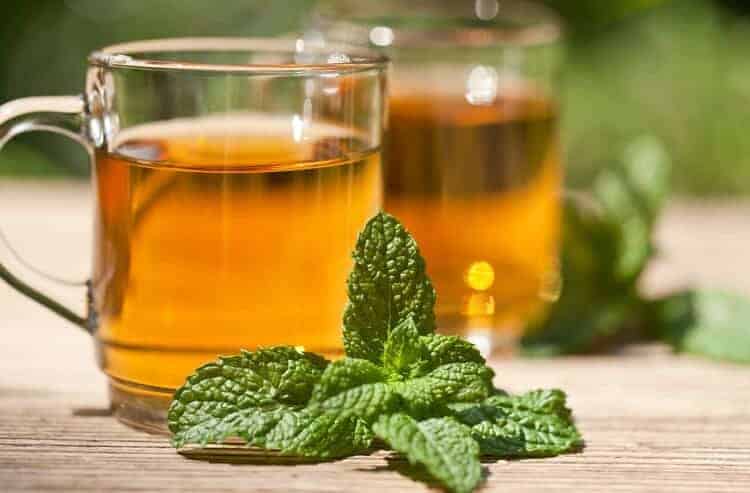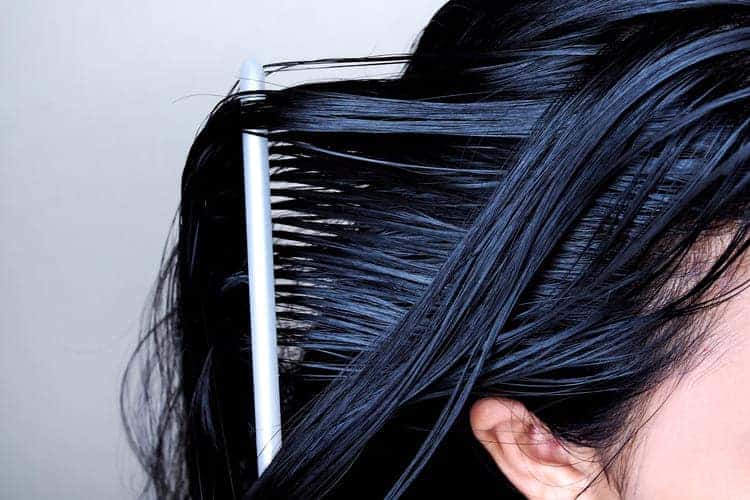
Peppermint tea is one of the easiest ways to add herbs into your hair care routine (without having to make complicated DIY herbal hair products). So, in this article we’re going to look at how to use peppermint tea for hair, including
- the benefits.
- how to brew the tea.
- the two ways you can add it to your natural hair care routine.
HOW DO YOU USE PEPPERMINT TEA FOR HAIR GROWTH?
Here’s a simple recipe to use when making peppermint tea for your hair.
Ingredients
- 1 – 1.5 tablespoons of dried mint leaves (or 3 – 4 mint tea bags)
- 4 cups of hot (not boiling) water
- Optional: 1 teaspoon raw honey or glycerin (they add humectant properties)
Instructions
1. Place the mint leaves in hot water.
2. Cover the tea and allow the mint leaves to steep until the water is cool.
3. Remove the tea leaves. Now you’re ready to use the tea as outlined below.
NOTE: there’s no standard recipe for tea rinses. So, feel free to experiment and change the amount of mint you use.
1. As A Hair Rinse
Once you’ve brewed the peppermint tea and it has cooled down, remove the tea bags/leaves. Then pour the tea into a plastic bowl or into an applicator bottle with a spout.
Now you’re ready for your rinse. Here are some tips to keep in mind:
- The best time to do a full mint tea rinse is on your wash day.
- The tea rinse should be the last step, after you’ve shampooed and conditioned your hair.
- If you’re using a bowl, slowly pour the tea onto your head, massaging it into your scalp as you pour. Pouring it slowly will ensure that you cover every inch of your head.
- If you’re using an applicator bottle, then apply the tea directly to your scalp and massage it in.
- You can allow the tea to soak in for 15 minutes and then rinse it out. OR you can leave it in and carry on with your hair care routine.
2. As A Hair Spray
To use peppermint tea as a spray, simply pour the cooled tea into a spray bottle.
Then spray the tea onto your scalp either:
- After shampooing and conditioning.
- Daily as a refreshing scalp spray.
You can also spray the tea onto your hair strands. This can be particularly helpful as a quick refresher for kinky/curly hair.
IS PEPPERMINT TEA RINSE GOOD FOR YOUR HAIR?

1. May Increase Blood Flow to The Scalp
Peppermint contains menthol, a compound that acts as a vasodilator (source). Simply put, vasodilators are compounds that dilate or open blood vessels.
This means there’s more blood flowing to the scalp.
And since blood carries nutrients, regular use of peppermint tea may help to promote hair growth.
2. Anti-inflammatory
Menthol – which is the main active compound in peppermint – imparts a cooling and tingling sensation that is very soothing to an inflamed scalp.
In fact, mint is sometimes used as a natural remedy for itching, dandruff and other inflammatory scalp conditions.
3. Antimicrobial and antifungal
When it comes to fighting off fungi and other microbes, the star component of peppermint that is responsible for this is, once again, menthol!
So whether you’re struggling with seborrheic dermatitis or dandruff, peppermint is a natural remedy that may offer relief.
FAQs ABOUT PEPPERMINT TEA RINSE FOR HAIR
Can you leave peppermint tea in your hair?
Like many tea rinses, you can use peppermint tea as a leave-in. Simply apply the tea to your scalp after shampooing and conditioning. Alternatively, you can also use the tea as a spray to refresh your hair in between wash days.
CONCLUSION
Peppermint tea is just one of the many teas that you can use for your hair. You can also use herbs like hibiscus, rosemary, nettle as well as regular green or black tea.
To learn more about all the amazing options that are available to you, be sure to check out this guide on tea rinses for hair growth.
In addition, remember that peppermint tea is not as concentrated as peppermint oil or an herb-infused oil.
So, if you’re looking for a stronger hair growth remedies, then be sure to read these additional resources:
- How to Mix Essential Oils for Hair Growth: A Step-by-Step Guide with Dilution Chart
- How to Infuse Herbs In Oil for Hair Growth: Best Herbs and Oils, Fastest Method and DIY Recipe
You Might Also Like:
Best Carrier Oils for Hair Loss and Regrowth: A Complete Guide
Rosemary vs Peppermint Oil for Hair Growth: Which Should You Use?
What To Mix With Shea Butter for Skin and Hair: Tips and Recipes
DIY Lavender Essential Oil Recipes for Hair Growth & Thickness

